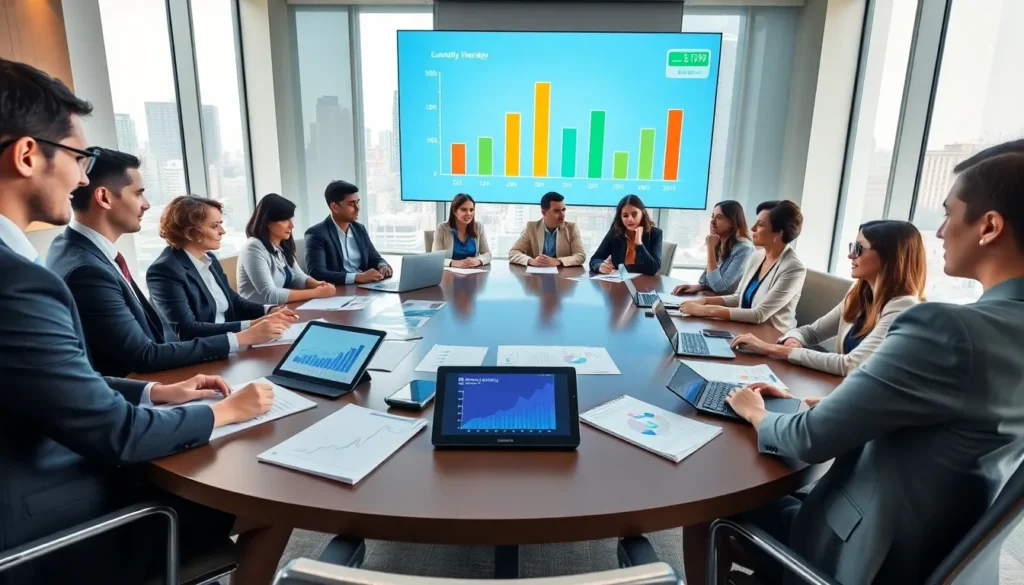Table of Contents
ToggleHave you ever wondered how the economy influences your daily life? Trends are like those ever-changing fashions you see on the runway, with economists acting as the trendsetters. Whether it’s the price of avocado toast or the rise of remote work, understanding economic trends can give insight into future purchasing decisions and government actions. Buckle up, because we’re diving deep into the intriguing realm of economic trends, where money matters and knowledge is power.
Understanding Economic Trends

Economic trends refer to the overarching patterns and shifts that take place in an economy over time. These trends can be observed through various indicators like GDP growth rates, inflation levels, and employment statistics. They help analysts and policymakers understand the direction an economy is taking, enabling well-informed choice-making. Understanding these trends is crucial because they affect not just businesses and investors but also everyday consumers. When awareness of economic trends is heightened, individuals can make better financial choices, like investing, saving, or spending wisely.
Types of Economic Trends
There are several types of economic trends that can be analyzed. Here are a few to consider:
1. Long-Term Trends
These trends span several years, often decades. Example: The continuous increase in technology adoption in various sectors.
2. Short-Term Trends
Short-term trends are often seasonal or cyclic, reflecting temporary changes. Example: Holiday retail sales spikes.
3. Secular Trends
These are persistent trends that last several years and affect various economic factors. Example: The ongoing shift towards renewable energy sources.
4. Counter-Trends
Counter-trends occur in opposition to prevailing trends. Example: Increasing desires for local products even though globalization.
Examples of Current Economic Trends
Currently, several significant economic trends deserve attention:
1. Remote Work Economies
The COVID-19 pandemic accelerated the shift towards remote work, reshaping traditional work environments. Companies are now adopting flexible work arrangements, which are influencing real estate markets and urban planning.
2. Sustainability Priorities
More businesses are recognizing the importance of sustainability. Trends show consumer preferences shifting towards eco-friendly products, prompting companies to adopt sustainable practices.
3. Digital Transformation
E-commerce has outpaced traditional shopping. Consumers increasingly prefer online platforms over physical stores, impacting retail industries profoundly.
4. Cryptocurrency Adoption
As digital currencies gain popularity, businesses are beginning to accept them as legitimate payment methods. This trend reflects a broader acceptance of innovative financial solutions.
Impact of Technological Advancement on Economic Trends
Technology leaves an indelible mark on economic trends. The rise of automation and artificial intelligence isn’t just a buzzword: it’s reshaping job markets and skill requirements.
Jobs that were once staples are now being augmented or replaced by machines, increasing productivity but also raising concerns about unemployment. Investors are turning their gaze towards tech stocks more than ever, especially in sectors like healthcare, where telemedicine is expanding.
Also, innovations such as blockchain technology are creating new economic models, showcasing how technology drives economic evolution.
Global Influences on Economic Trends
The world is more interconnected than ever. Global dynamics, political, environmental, or economic, can significantly influence national economic trends. For instance, trade agreements or tariffs imposed between countries can have cascading effects on local economies.
Also, events such as the recent pandemic highlighted how a health crisis in one part of the world can trigger economic repercussions worldwide, showcasing the importance of being alert to overseas developments. Currency fluctuations, international investments, and geopolitical tensions remind us that understanding global affairs is crucial for grasping economic trends.
Future Economic Trends to Watch
As we look ahead, several emerging trends warrant attention:
1. Hybrid Work Models
With remote work here to stay, hybrid models where employees alternate between remote and in-office work are likely to become the norm.
2. Green Investments
Expect an influx of capital towards sustainable technologies and renewable resources as climate change awareness grows, impacting investment behaviors.
3. Advances in Biotechnology
The biopharmaceutical sector is poised for growth as technology aids in developing groundbreaking treatments.
4. Increase in Freelance Economies
As more individuals seek flexibility in their careers, the gig economy is set to expand, changing traditional employment patterns.




